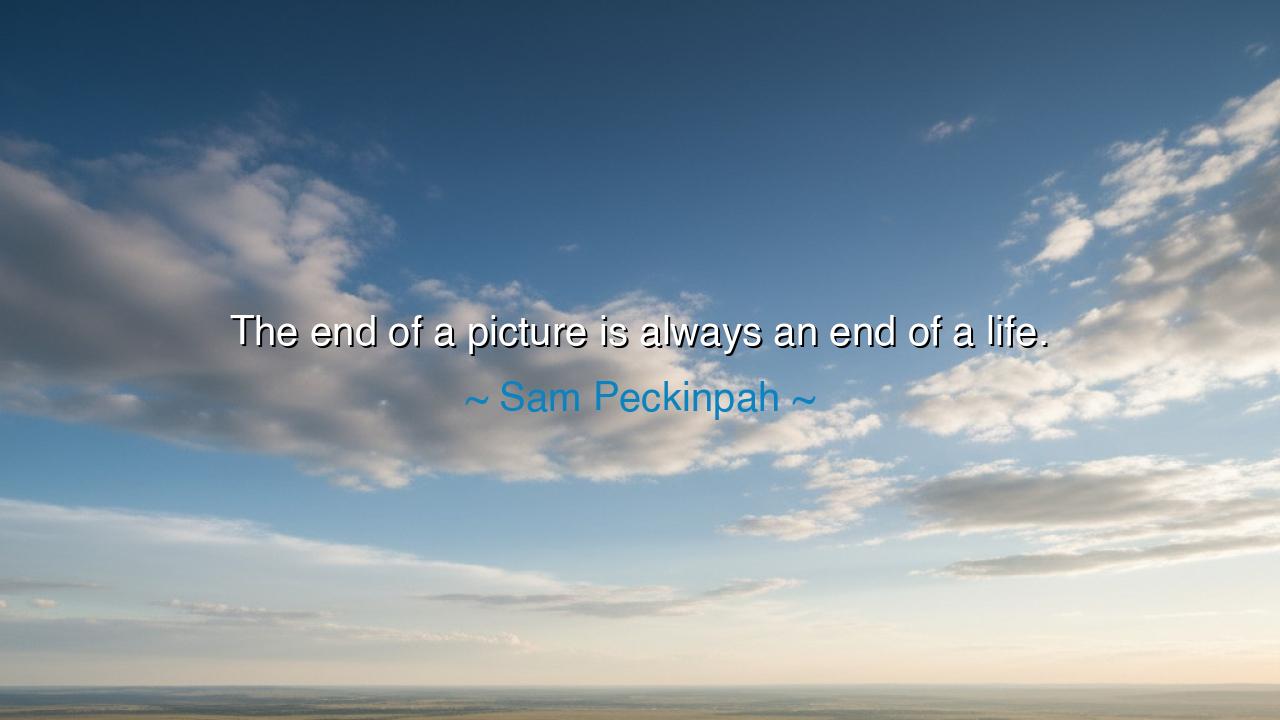
The end of a picture is always an end of a life.






The end of a picture is always an end of a life. These are the profound words of Sam Peckinpah, spoken not just as a director of film, but as a philosopher of life itself. In these words, there is an understanding of the deep connection between creation and destruction, between beginning and end. For in the closing of one chapter, there lies the essence of the next, and in the final frame of a picture, there lies the finality of a life lived. Just as a painter completes a masterpiece only to see it take on a life of its own, so too does the filmmaker watch their creation come to an end, and with it, the moment of closure.
In the ancient world, it was understood that life is a cycle, ever-moving, ever-changing. It has been said that the true nature of art is to capture the fleeting nature of existence. The ancient Greeks, in their tragic dramas, understood that every life, no matter how heroic, ends in tragedy. The heroes of old, such as Achilles and Hector, whose stories we still tell, all met their ends in battle. The tragic flaw, the idea that all things must reach their conclusion, resonates deeply in the human experience. And so, when Sam Peckinpah speaks of the end of a picture, he is invoking this ancient truth: every creation, every life, must one day be completed.
Consider the story of Socrates, who, in his final days, spoke of the philosopher's journey toward wisdom as one that must conclude with death. Death, to him, was not something to be feared but something that marked the end of a quest for understanding. Similarly, in the realm of film, a picture is not complete until it reaches its conclusion, just as a philosopher’s life reaches its conclusion when they pass from this world. The idea of closure is central here; without an ending, a story, a life, would never find its true meaning. The picture, like life, must ultimately reach its end, and in that end, its full significance is revealed.
But what does this mean for those of us who are not filmmakers, who are not standing behind the lens of a camera? The lesson from Sam Peckinpah is simple yet profound: embrace the end. There are endings in every corner of life—endings of relationships, jobs, dreams, and, of course, life itself. Often, we fear these ends, seeking to avoid them, to hold onto the fleeting moments as if they can be forever preserved. Yet, as the ancients knew, there is no life without death, no creation without destruction. Without the end, the beginning has no meaning. It is only in the conclusion that we understand the true weight of the journey.
In history, there are many examples of those who lived with this understanding, one of the most striking being Leonidas of Sparta. His story is not only about his great courage and valor but also about his understanding of death's inevitability. At Thermopylae, he knew that his life, and the lives of his warriors, would come to an end. Yet, in this moment of sacrifice, they created an enduring legacy that would define the history of Greece. The end of their lives was the beginning of a new chapter for their nation, just as the end of a picture marks the beginning of the impact it has on the world.
The end of a picture, then, is not merely an end. It is the conclusion of a journey, a revelation of the totality of what came before. Just as the final moments of a life offer the final clarity and understanding of what that life meant, so too does the end of a picture give meaning to everything that preceded it. In the film, the last frame often reveals the true purpose of the story, the lesson learned, or the truth discovered. It is the same in life. Our deaths will give meaning to the lives we have led, and only when we acknowledge that each end is sacred will we be able to truly live.
Thus, the lesson from Sam Peckinpah is one that speaks to us all: embrace the endings in our lives, for they are not the cessation of our journey but the culmination of all that we have experienced. Live fully in the present, knowing that one day, your picture will come to its close. And when it does, may it be with the understanding that the end is but a beginning, and that in the final moments of your life, you will see the true meaning of all that has come before. To live fully is to honor the inevitable end with grace and wisdom, for it is in that end that the depth of our story is revealed.






AAdministratorAdministrator
Welcome, honored guests. Please leave a comment, we will respond soon